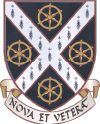Catz celebrates World Book Day 2022
To mark World Book Day 2022, the day when the world comes together to celebrate reading and the joys it can bring, we asked some of the Catz community to share a favourite book of theirs, why they like it and why you should read it.

Educated, Tara Westover
Chosen by: Lucy Bartel (2020, Comparative Social Policy) and MCR Co-President
One of the best books I read this year was Educated by Tara Westover. It’s a wonderful memoir – gripping, insightful, and heart-breaking in equal parts – about the author’s journey to higher education, overcoming all odds.
I’m a social policy student at Catz, so I was particularly drawn to the ways in which her account emphasises the value of educational opportunity in breaking intergenerational cycles of abuse and class barriers.

No es un río (This is Not a River), Selva Almada
Chosen by: Ben Bollig, Professor of Spanish American Literature
Selva Almada’s latest book is a ghost story set in Argentina about a group of men who go fishing together and end up having a strange encounter. It hasn’t yet been translated into English, but look out for it when it is!
If you’re not a Spanish speaker, then try another of her books: Chicas muertas (Dead Girls). It’s a work of true crime fiction about three femicides that took places in 1980s Argentina.
I love the way Almada writes because she has a brilliant grasp of capturing how people actually speak, which makes her work feel all the more real.

Dr Glas (Dr Glass), Hjalmar Söderberg
Chosen by: Professor Kersti Börjars, Master of St Catherine’s
It is a short novel in the form of the doctor’s journal. In one way the story is about the young wife of a clergyman, the Reverend Gregorius, who comes to seek the doctor’s help because she is disgusted by her husband’s attention. However, more importantly it is a book about Dr Glas wrestling with morality, life and love. In a sense it is original Scandi Noir.
A modern author, Bengt Ohlander, rewrote the story in 2004 from Gregorius’s perspective. Reading it is a good exercise in looking at things from both sides.

Down and Out in England and Italy, Alberto Prunetti
Chosen by: Barbara Costa, Assistant Librarian
I recently read and enjoyed Down and Out in England and Italy by Alberto Prunetti. It is honest, harsh and humorous; it is about migration, working class, capital, higher education, return to homeland, and unrealised human potential. ‘For those who travel to understand their stories or the stories of those like them.’
It is on the Catz library shelves along with the renowned Down and Out in Paris and London by George Orwell, which deeply inspired Prunetti’s book.

Freedom is a Constant Struggle: Ferguson, Palestine, and the Foundations of a Movement, Angela Y Davis
Chosen by: Chloe Edwards, Library Assistant
My favourite book is Freedom is a Constant Struggle – a collection of essays, interviews, and speeches from the powerful Angela Davis. As a teenager this work really opened my eyes to ideas of intersectionality, liberation, legacy, and struggles against oppression and state violence.
Davis encourages us to imagine and work towards a better world, and the constructive, reflective nature of Davis’ words have stuck with me ever since.

Ingenium: Five Machines That Changed The World, Mark Denny
Chosen by: Joe Foster (2020, History)
Ingenium is a very accessible book explaining the physics behind early machinery in a way that both someone who has never studied physics and someone studying physics now can benefit from. I have found it very useful for my Technology and Innovation paper and it is quite a fun book to read as well. Would recommend 10/10.

Outline, Rachel Cusk
Chosen by: Bart van Es, Professor of English Literature
Cusk is one of my favourite current writers and her Outline trilogy (Outline, Transit, and Kudos) is a modern masterpiece: brilliant minimalist writing that pushes the bounds of the novel.
Excitingly, Rachel is coming to Oxford next term and my plan is to host her at Catz for a seminar.

The Waves, Virginia Woolf, and Remainder, Tom McCarthy
Isavella Vouza (2020, DPhil English)
Italo Calvino defines as ‘classic’ any book which, with each rereading, offers as much of a sense of discovery as the first reading. That’s what Virginia Woolf’s The Waves (1931) is for me. Every single time, this book has given me a fresh outlook on life and ways of connecting with it more intimately. Especially now that any kind of proximity (human, animal or ecological more broadly) is more wanted than ever, I would advise anyone who enjoys poetic meditations on life, ecological connections, solitude and collectivity, to give this challenging book a go.
While The Waves is an admittedly more demanding novel, a less experimental yet equally powerful novel is Tom McCarthy’s Remainder (2005). The novel is about an amnesiac who is really going the extra mile to trigger his memory. It’s a book that undoubtedly stays with you; you think about it at night; you think about it the next day and the day after that. For me it has lingered on since the first day I read it in 2016. Enjoy reading!

